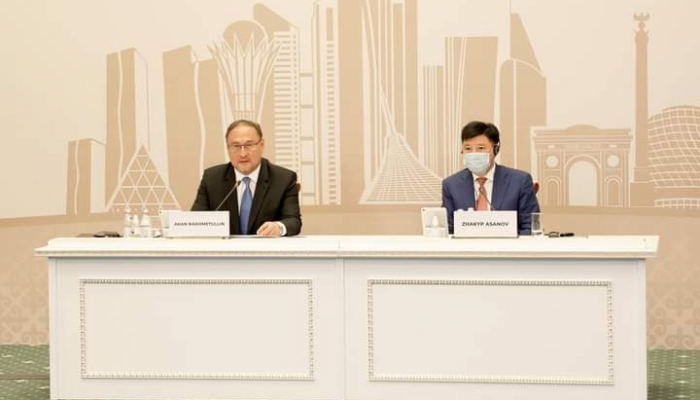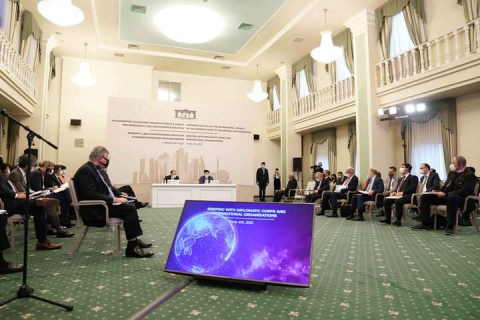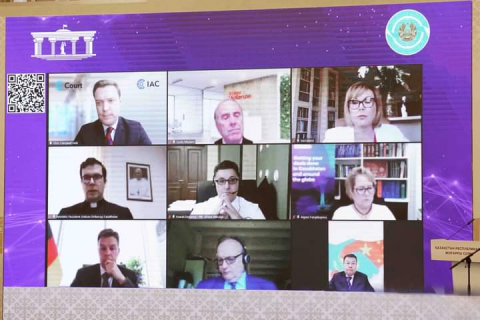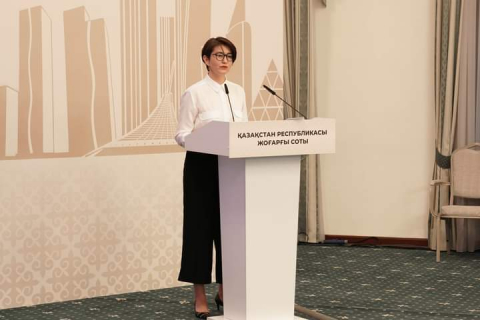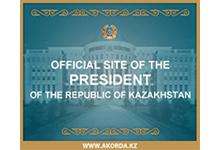Fri, 06/04/2021 - 11:14
Nur-Sultan, 4 June 2021 – The latest regular meeting of the International Council of the Supreme Court of the Republic of Kazakhstan was notable not only for its setup but also its representativeness.
Among its participants were the International Council members, including chairpersons of the judicial collegiums and the Supreme Court judges, the heads of its Department, the Academy of Justice, and the foreign diplomatic corps accredited in Nur-Sultan.
More than 100 representatives of foreign and Kazakh diplomatic missions, as well as international organisations, followed the discussion online, and about 30 were present in the conference hall of the Supreme Court.
Kazakhstan’s Deputy Minister of Foreign Affairs Akan Rakhmetullin moderated the first part of the International Council’s meeting. He introduced the briefing’s arrangements for the heads of the diplomatic corps and international organisations.
Chairman of the Supreme Court Zhakyp Asanov welcomed the guests. While reporting the changes in the country’s judicial system, he did not deny the problems and highlighted his vision of anm algorithm for tackling them.
An independent expert in the field of legal reforms Nazgul Yergalieva made a presentation on “Courts of Kazakhstan: realities, trends, prospects”. With her solid educational and professional background in the field of human rights protection, she has been actively involved in the design and implementation of reforms along with other national experts.
The speaker began her presentation with seven main challenges facing, in her opinion, the courts in Kazakhstan: dependence on the executive branch and court chairs, insufficient professionalism of the judges, corruption, accusatory bias, priority given to government agencies, low-quality judicial acts and court services. For each of them Yergalieva listed the measures taken to address them, and their effects.
It was indicated that according to the judicial statistics, the number of acquittals in Kazakh courts had doubled from 397 in 2015-17 to 861 in 2018-20. The number of acquitals of those accused of grave and particularly grave crimes increased from 12 in 2015 to 210 in 2019 and 105 in 2020.
“The effect of these transformations has allowed Kazakhstan to improve its performance in international rankings. In the Global Competitiveness Index, position on the Independence of the Judiciary ranking improved from 79th to 71st in 2017-19. For 2017-20, position in the rule of law index Civil justice rose from 50th to 40th, and in the Criminal justice index it increased from 70 to 58, and in Doing business Enforcement of Contracts – from 9th to 4th, underlined the speaker.
She also cited the results of the national survey on the public trust in the judicial system and the court users satisfaction survey, both held by independent sociological services in 2020.
“Only 53% of the general public trusts the court system, while 67% of the court system’s users rated their experience as 4 and 5 on a five-point scale. This phenomenon can be observed in other countries too and it speaks of the difficulty of changing public attitudes in a short time,” added the speaker.
Yergalieva outlined five main measures taken to ensure competitive nature of a judicial process in Kazakhstan, digitalization of justice, uniformity of judicial practice, efficiency of the civil process and the fight against corruption.
In conclusion, she voiced a number of recommendations to improve the efficiency of the reforms:
- Engage more local judges to develop judicial leadership that will drive change from bottom up;
- Focus on high quality judicial education to bring a new generation of judges – highly competent and independent in their mind and spirit;
- Involve independent multidsiplinary teams of experts in order to evaluate the impact of these reforms on the judicial system and beyond to have soild evidential basis for future reforms.
The Supreme Court Chairman summarised the first part of the meeting. According to Chairman Asanov, President Kassym-Jomart Tokayev pays special attention to the issues of modernizing the system of justice. Starting with his election program, then in the latest State-of-the-Nation address, speeches at the VIII Congress of Judges, a meeting on the modernization of the judicial system, President Tokayev has emphasized that the strategic task of the judiciary is to increase the society’ trust to the nation’s courts. In this context, under the leadership of the Head of State, a special commission on the reform of the law enforcement and judicial systems was launched.
“All countries keep implementing judicial reforms. It is a continuous process. And we are no exception. We do not claim that our courts and judges are the ideals of justice. Like in other jurisdictions, there are many problems. The current reform allows to address them.” He also emphasised presence of a legal foundation in Kazakhstan that is consistent with the internationally dominant vision of justice.
Asanov expressed the need to calibrate some laws and change the thinking paradigm of some part of the judges. Addressing the diplomats, he underlined that the reform was “in its active phase.”
The speaker reported on the Commission’s work on the reform of the law enforcement and judicial systems. The priority of this team of professionals is to implement ambitious changes to increase the public trust in the court system.
In the second part of the meeting, Chairman Asanov introduced a new member of the International Council, Gavin Slade, Professor of the Nazarbayev University, and welcomed a guest – Khawar Qureshi, the U.K. Queen’s Councel.
The Supreme Court Chairman briefly spoke about the work of the courts during the pandemic, including legislative preparedness for online processes and rapid increase in IT capacities. The numbers of online sessions grew from 150 per day before the state of emergency to 4,500 (96% of all sessions) by May-June 2021. The clarifications on the possibility of resolving disputes out-of-court helped prevent the growth of claims and litigation and avoid massive bankruptcies.
When speaking on the first issue, Aigul Kenzhebayeva, Managing Partner of Dentons Europe’s Almaty and Nur-Sultan offices, identified crucial problems of regulating representation in court, namely abuse of professional rights, absence of the legal status for law firms, conflicts of interest and unified approach to regulation of the legal profession. Measures were proposed to improve legislation and to reform the institute of professional representation. Maidan Suleimenov, Chairman of the Kazakhstan International Arbitration, presented the international best practices of such representation.
Introducing the next discussion, Chairman Asanov proposed considering the issue whether legal measures for holding parties in contempt of court meet the challenges in practice. Addressing this issue, Oksana Kachalova, Associate Professor of the Russian State University of Justice, indicated that the reasons for scandalising justice were diverse, and that they did not always reflect the actual state of justice within a country. Thus, the European Court of Human Rights (ECHR) annually satisfies about 5 out of 300 complaints against the United Kingdom. The speaker noted the principle of the ECHR, when “the courts shall be protected from unjustified attacks, the judges have to be cautious, and thus they should not respond to criticism.”
“Without respecting courts, it is hardly possible to ensure the genuine judicial independence. The lack of adequate response to open pressure on justice leads to negative consequences for the rule of law,” he said. The discussion in Russia on the possibilities of introducing individual liability for scandalising justice.
Besides, Pavel Goncharov, the judge of the Tallinn District Court (Estonia) and Zhumageldy Yelyubayev, the Chairman of the Kazakhstan Bar Association, spoke about the law enforcement practice in considering cases of contempt of court.
The meeting generated dynamic and constructive discussions. The follow-up recommendations would be published on the official website of the Supreme Court and communicated to competent authorities for further implementation.
Press Service of the Supreme Court
of the Republic of Kazakhstan

